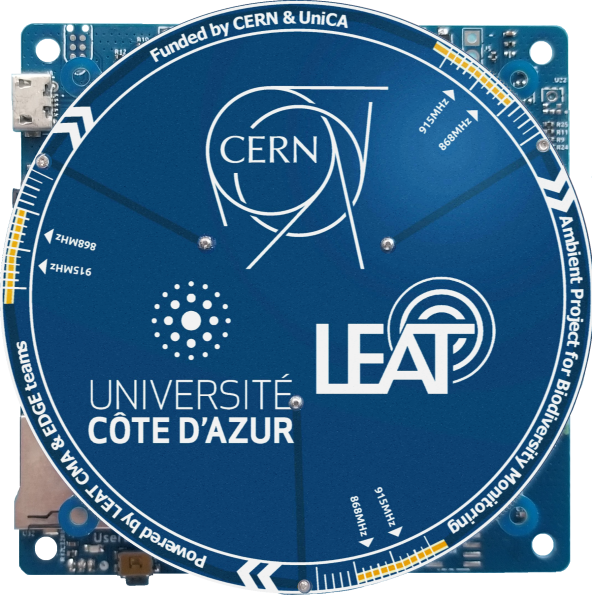

Context
This internship subject takes place in the EDGE team of LEAT laboratory that traditionally works on Edge computing and digital systems. More specifically, it takes part a collaboration with CERN in Geneva in order to design, develop and deploy a wireless sensor network to monitor the biodiversity on the campus of CERN in Switzerland. The goal being to design sensor nodes endowed with embedded AI to automatically and autonomously detect the presence of birds and classify the species according to their song [1, 2]. The digital electronic part of the node has already been designed and validated. It is composed of a microcontroller unit (MCU), a battery, a solar panel, and a set of sensors monitoring the environmental conditions[3]. Each node has also a microphone specifically used to detect birds.
The main goal of this internship is to work on the analog frontend of the microphone in order to implement a low-power audio amplitude threshold in given frequency band as an analog design. This will generate a trigger signal to wake the main microcontroller up, collect the audio signal with the ADC and process it to detect bird songs. The rest of the time, the microcontroller and the ADC can be put to sleep in order to reduce power consumption. The design should provide an easy way to set the threshold, and the filter should possibly be reconfigurable in order to detect other kind of sounds in other frequency bands (e.g., bats).
Project missions
The project mission will be organized in several steps:
- bibliography on bird song detection on the Edge,
- study the existing audio capture platform (e.g., characteristics of the microphone),
- design and simulate a reconfigurable filter for bird songs and bat calls,
- design and simulate an audio amplitude detector with adjustable threshold,
- implement the filter and threshold on a first prototype printed circuit board,
- measure the characteristics of the circuit (noise, power consumption…),
- integrate the solution onto the existing platform,
- write a publication on this work in conference or journal.
References
[1] J. Höchst et al. “Bird@Edge: Bird Species Recognition at the Edge.” In: International Conference on Networked Systems. 2022.
[2] D. Meedeniya, I. Ariyarathne, M. Bandara, R. Jayasundara, and C. Perera. “A survey on deep learning based forest environment sound classification at the edge.” In: ACM Computing Surveys (2023).
[3] D. Zeuss et al. “Nature 4.0: a networked sensor system for integrated biodiversity monitoring.” In: Global Change Biology (2024).
Practical information
- Location: LEAT Lab, SophiaTech Campus, France
- Duration: 4-6 months from March 2025
- Profile: analog electrical engineering
- Research keywords: analog circuits, signal processing, low power
Contact and supervision
Benoît Miramond, Pierre-Emmanuel Novac
Université Côte d’Azur, LEAT, CNRS
Polytech Nice Sophia
04 89 15 44 39
firstname.name@univ-cotedazur.fr